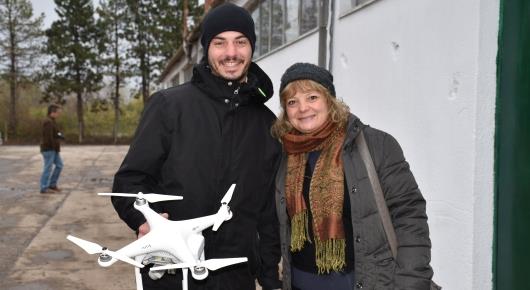Technology can be key to empowering rural women

While the digital revolution is reaching rural areas in many developing countries, the rural digital divide continues to present considerable challenges. The problem is even more acute for women, who face a triple divide: digital, rural, and gender.
A new FAO publication on mainstreaming gender in the use of information and communication technologies, available in English, looks at how men and women in rural areas can harness the benefits of these new technologies.
“Despite the promises of the digital revolution, rural women still don’t have the same access and control of information and communication technologies as men,” said Sophie Treinen, FAO information and knowledge management officer.
Reasons for this include cultural and social factors, time and mobility constraints, heavy workloads, inadequate financial resources, and low level of education. Yet in many cases, technology can make a significant contribution to overcoming these obstacles, underscoring the importance of ensuring women’s opportunities to unlock the benefits of these technologies.
“In order to leave no one behind, and not to exacerbate these divides, FAO proposes developing national digital strategies for agriculture and rural development where gender issues are mainstreamed,” Treinen added.
With a gender-sensitive approach, these strategies can further gender equality in rural areas and make a subsequent impact on poverty alleviation through increased agricultural production, improved marketing, and the development of other income-generating activities, especially those managed by women.
It is critical that such initiatives seeking to improve gender equality target not only women but also men, along with the larger family unit and the community. A family- or even community-centred approach to information and communication technology initiatives will help solidify the notion that it is important for women to be able to use them.
Today, to mark International Women’s Day, a joint event of FAO and the International Fund for Agricultural Development (IFAD) in Rome is discussing this same topic, focusing on the role of information communications technologies in supporting rural women's economic empowerment.
A good example from the former Yugoslav Republic Macedonia
The new FAO publication features several case studies from all over the world, including the story of Suzana Dimitrievska from the former Yugoslav Republic of Macedonia. Dimitrievska wanted to run her organic farm more efficiently through digital tools, and she identified software that would enable her to perform a range of planning and management functions – without ever leaving the office.
At first, the farm management software company’s officials were surprised at being approached by a female farmer, but she wasn’t dissuaded. Her persistence paid off in the end. The software has given her the decision-making power she sought, helping her to pinpoint which crops are worth growing on the farm and in what quantities. Additionally, Dimitrievska has managed to lower the cost of labour and expenditures on gas and fertilizer.
The excessively high temperature of the past season has made her think further, and as a next step, Dimitrievska is now considering investing in precision agriculture.
The publication, titled “Gender and ICTs - Mainstreaming gender in the use of information and communication technologies (ICTs) for agriculture and rural development” is available online.
8 March 2018, Budapest, Hungary
